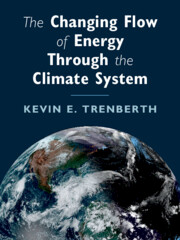Book contents
- The Changing Flow of Energy through the Climate System
- The Changing Flow of Energy through the Climate System
- Copyright page
- Contents
- Foreword
- Preface
- Acknowledgments
- 1 Earth and Climate System
- 2 Earth’s Energy Imbalance and Climate Change
- 3 Earth’s Energy Balance
- 4 The Sun–Earth System
- 5 Observations of Temperature, Moisture, Precipitation, and Radiation
- 6 The Climate System
- Flows of Energy
- Glossary
- Acronyms
- Bibliography
- Index
- References
2 - Earth’s Energy Imbalance and Climate Change
Published online by Cambridge University Press: 25 February 2022
- The Changing Flow of Energy through the Climate System
- The Changing Flow of Energy through the Climate System
- Copyright page
- Contents
- Foreword
- Preface
- Acknowledgments
- 1 Earth and Climate System
- 2 Earth’s Energy Imbalance and Climate Change
- 3 Earth’s Energy Balance
- 4 The Sun–Earth System
- 5 Observations of Temperature, Moisture, Precipitation, and Radiation
- 6 The Climate System
- Flows of Energy
- Glossary
- Acronyms
- Bibliography
- Index
- References
Summary
Climate change is a general term for long-term changes in climate of either sign. The term “global warming” was popularized by Wally Broecker in 1975 when he published a paper in Science magazine titled “Climatic change: are we on the brink of a pronounced global warming?”; although the term had been used as early as 1957 about Roger Revelle’s research. It has most commonly been interpreted to be synonymous with rises in global mean surface temperature (GMST) and associated with increasing carbon dioxide in the atmosphere, as put forward by Broecker. However, the term is ambiguous because warming can also refer to “heating,” which is more appropriate, and just one consequence of heating is an increase in temperature (another, for example, is “melting”). In fact, this would be a better way to use the term. Another ambiguity is whether it refers to all global temperature rise, for whatever reason, or whether it refers to only anthropogenic temperature increases. In any event, many people did not like it and climate change skeptics, in particular, preferred the term “climate change” to embrace both natural and anthropogenic sources, as well as the possibility that decreases could occur.
- Type
- Chapter
- Information
- The Changing Flow of Energy Through the Climate System , pp. 14 - 24Publisher: Cambridge University PressPrint publication year: 2022



